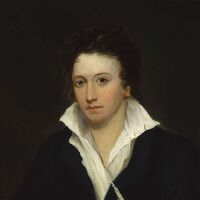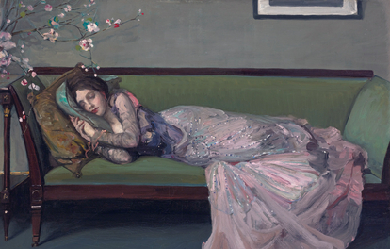The Zucca
I.
Summer was dead and Autumn was expiring,
And infant Winter laughed upon the land
All cloudlessly and cold;—when I, desiring
More in this world than any understand,
Wept o’er the beauty, which, like sea retiring,
Had left the earth bare as the wave-worn sand
Of my lorn heart, and o’er the grass and flowers
Pale for the falsehood of the flattering Hours.
II.
Summer was dead, but I yet lived to weep
The instability of all but weeping;
And on the Earth lulled in her winter sleep
I woke, and envied her as she was sleeping.
Too happy Earth! over thy face shall creep
The wakening vernal airs, until thou, leaping
From unremembered dreams, shalt... see
No death divide thy immortality.
III.
I loved—oh, no, I mean not one of ye,
Or any earthly one, though ye are dear
As human heart to human heart may be;—
I loved, I know not what—but this low sphere
And all that it contains, contains not thee,
Thou, whom, seen nowhere, I feel everywhere.
From Heaven and Earth, and all that in them are,
Veiled art thou, like a... star.
IV.
By Heaven and Earth, from all whose shapes thou flowest,
Neither to be contained, delayed, nor hidden;
Making divine the loftiest and the lowest,
When for a moment thou art not forbidden
To live within the life which thou bestowest;
And leaving noblest things vacant and chidden,
Cold as a corpse after the spirit’s flight
Blank as the sun after the birth of night.
V.
In winds, and trees, and streams, and all things common,
In music and the sweet unconscious tone
Of animals, and voices which are human,
Meant to express some feelings of their own;
In the soft motions and rare smile of woman,
In flowers and leaves, and in the grass fresh-shown,
Or dying in the autumn, I the most
Adore thee present or lament thee lost.
VI.
And thus I went lamenting, when I saw
A plant upon the river’s margin lie
Like one who loved beyond his nature’s law,
And in despair had cast him down to die;
Its leaves, which had outlived the frost, the thaw
Had blighted; like a heart which hatred’s eye
Can blast not, but which pity kills; the dew
Lay on its spotted leaves like tears too true.
VII.
The Heavens had wept upon it, but the Earth
Had crushed it on her maternal breast
...
VIII.
I bore it to my chamber, and I planted
It in a vase full of the lightest mould;
The winter beams which out of Heaven slanted
Fell through the window-panes, disrobed of cold,
Upon its leaves and flowers; the stars which panted
In evening for the Day, whose car has rolled
Over the horizon’s wave, with looks of light
Smiled on it from the threshold of the night.
IX.
The mitigated influences of air
And light revived the plant, and from it grew
Strong leaves and tendrils, and its flowers fair,
Full as a cup with the vine’s burning dew,
O’erflowed with golden colours; an atmosphere
Of vital warmth enfolded it anew,
And every impulse sent to every part
The unbeheld pulsations of its heart.
X.
Well might the plant grow beautiful and strong,
Even if the air and sun had smiled not on it;
For one wept o’er it all the winter long
Tears pure as Heaven’s rain, which fell upon it
Hour after hour; for sounds of softest song
Mixed with the stringed melodies that won it
To leave the gentle lips on which it slept,
Had loosed the heart of him who sat and wept.
XI.
Had loosed his heart, and shook the leaves and flowers 75
On which he wept, the while the savage storm
Waked by the darkest of December’s hours
Was raving round the chamber hushed and warm;
The birds were shivering in their leafless bowers,
The fish were frozen in the pools, the form
Of every summer plant was dead
Whilst this....


